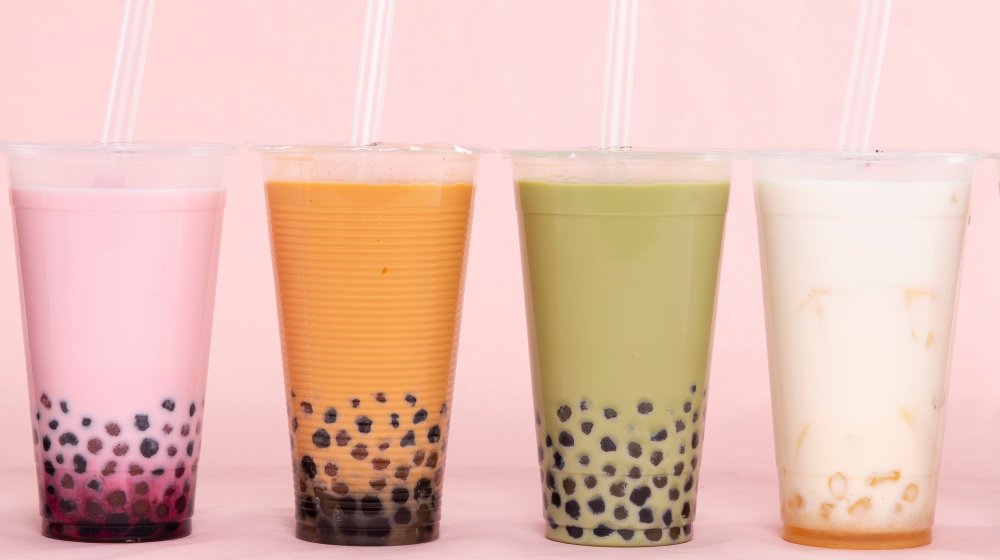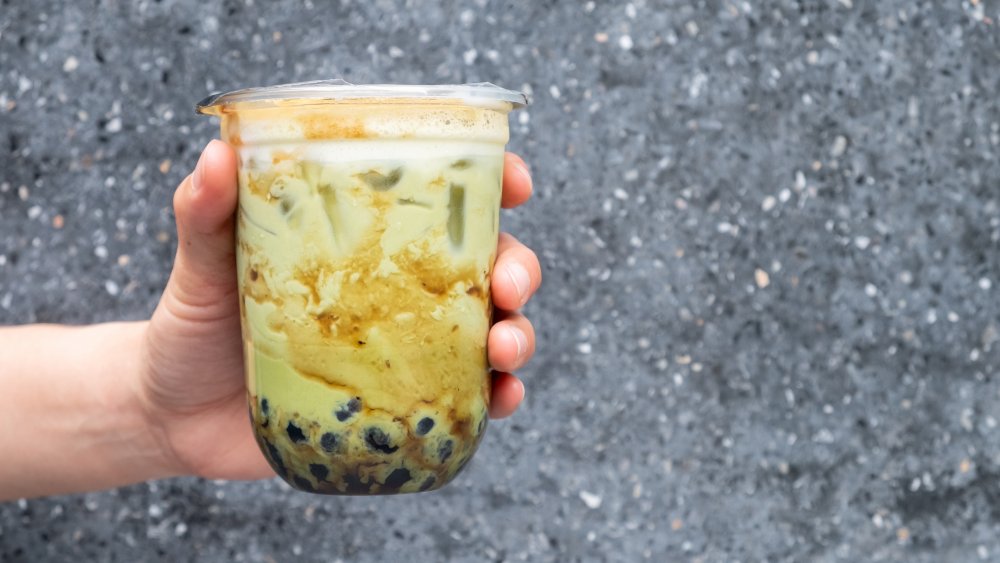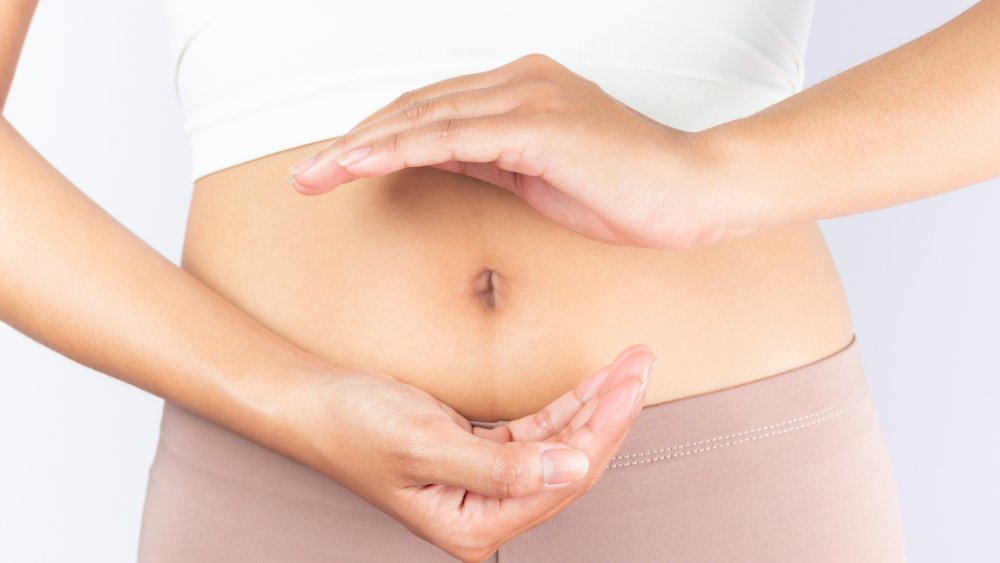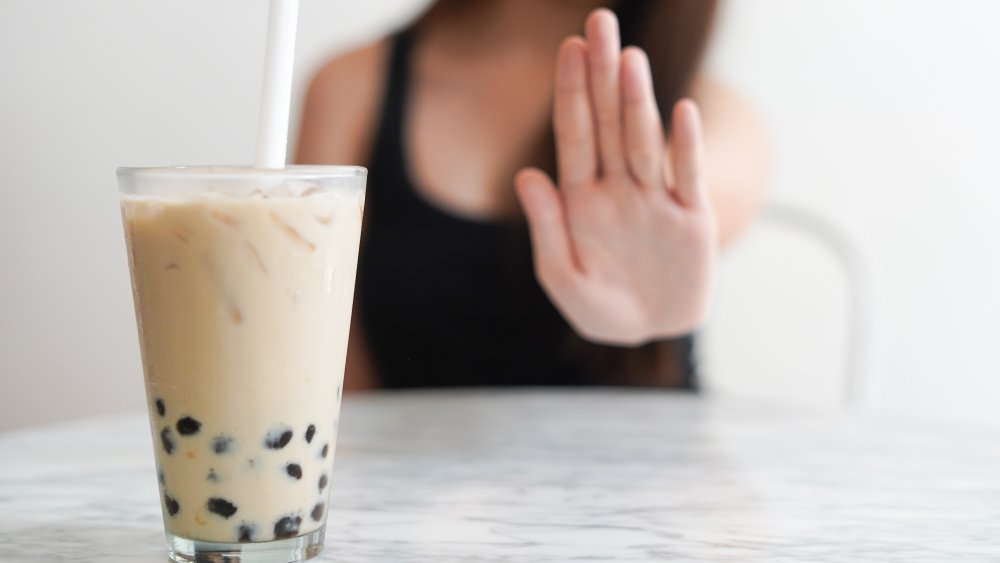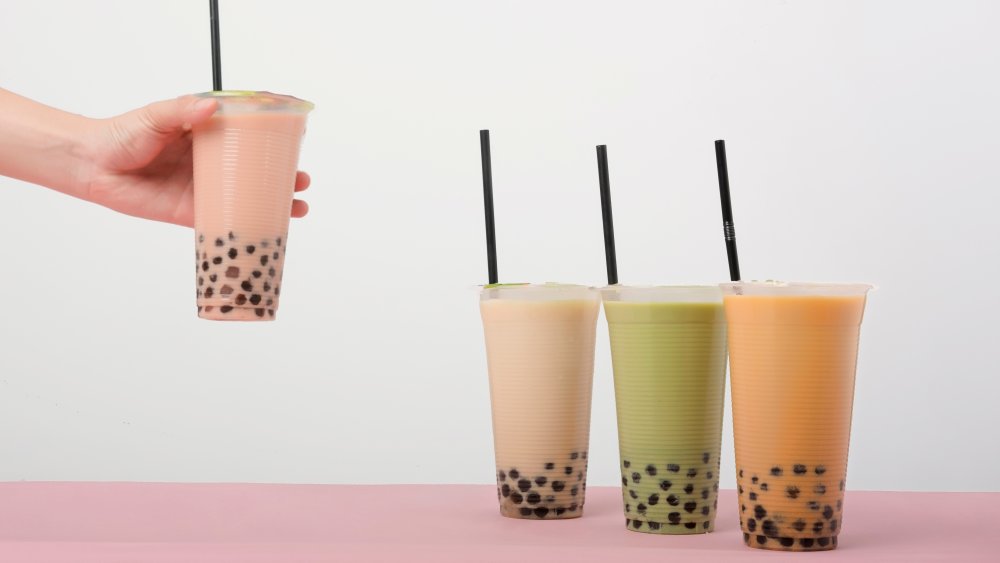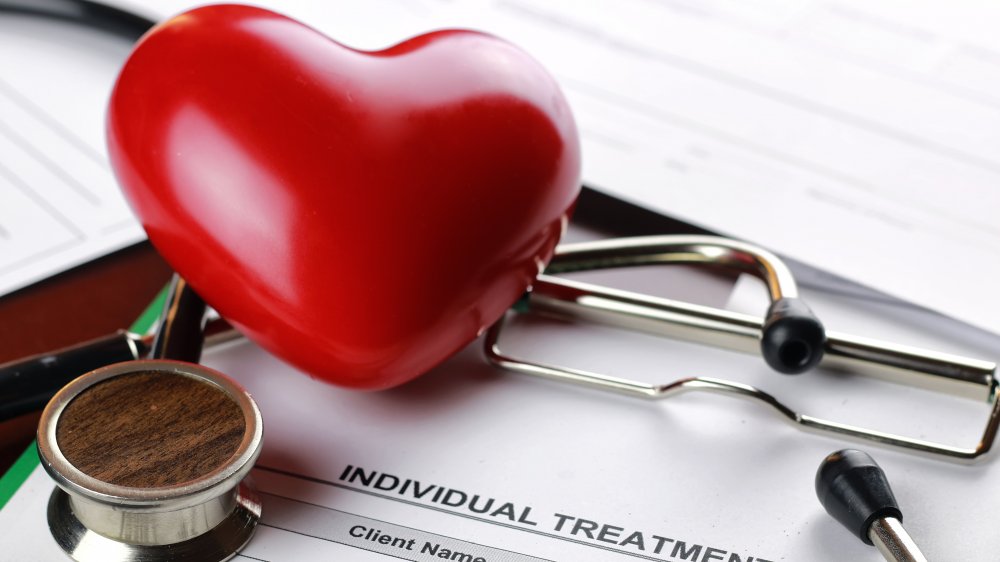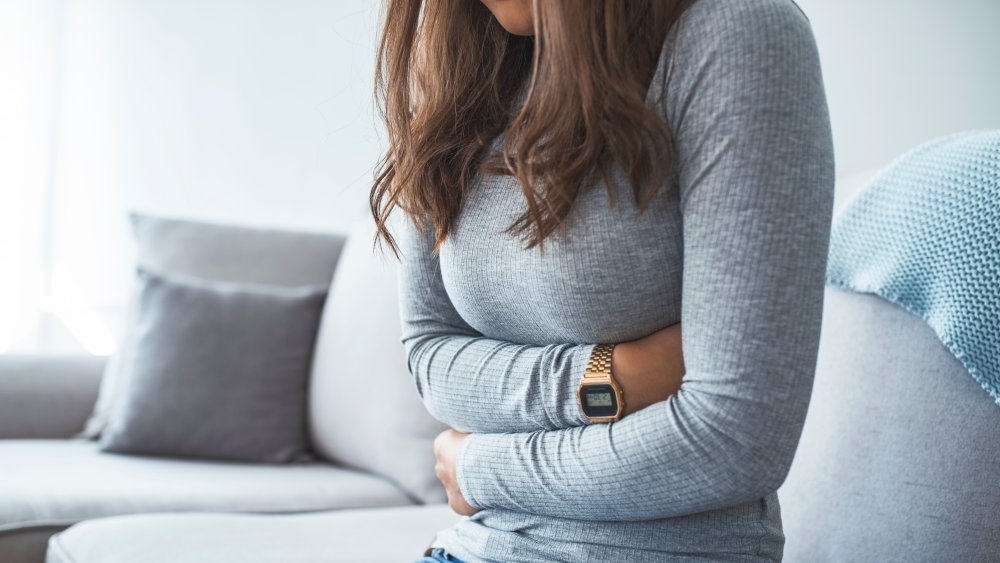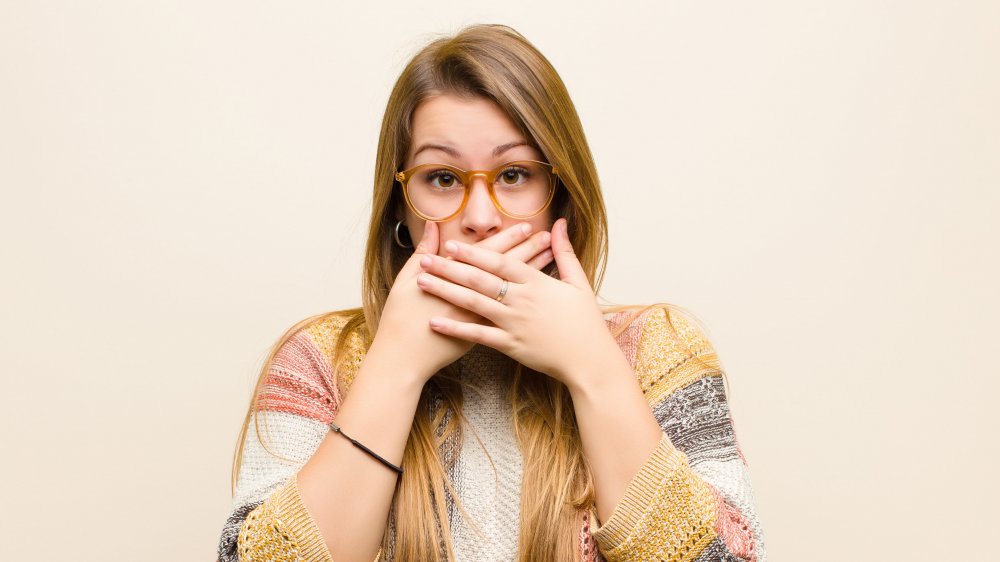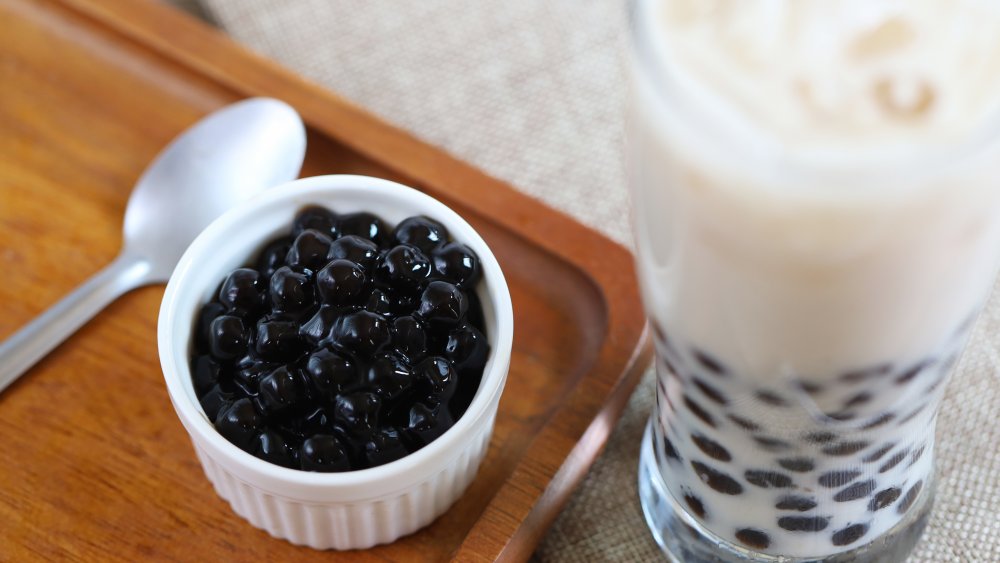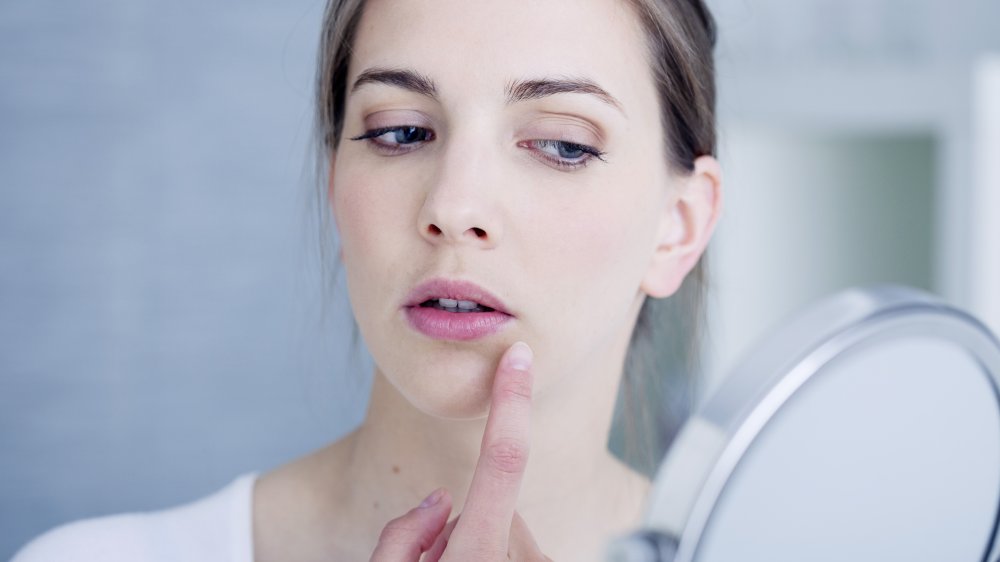When You Drink Bubble Tea Every Day, This Is What Happens To Your Body
Move over, cold brew — bubble tea is a trendy drink on the caffeine scene, and it's making quite the splash.
Created in Taiwan in the 1980s, bubble tea (also called boba tea) has quickly become a mainstay refreshment in the United States. According to Eat This, Not That!, as of December 2018, there were 800 boba-boasting shops in the U.S., presumably with even more locations destined to bubble up to serve the masses the colorful concoctions they crave. Boba is made with freshly brewed tea, milk, sugar, and an array of added flavors that have been thoroughly shaken to create bubbles in the beverages. The Daily Meal notes that either the satisfying bubbles made from shaking ingredients or the chewy tapioca pearls that reside at the bottom of the cup could be what gives the tea its name.
What's more, bubble tea can be customized with a variety of flavors, syrups, and jellies, resulting in a plethora of palate-pleasing permutations and eye-catching creations. And while a boba enthusiast could consume a different bubble tea drink daily, it is not necessarily the healthiest addition to a well-rounded diet. But what if you do decide to sip bubble tea regularly? This is what happens to your body when you drink bubble tea every day.
Drinking bubble tea every day can be hydrating
The Institute of Medicine of the National Academies recommends women drink approximately 2.7 liters of water daily. This can seem like a daunting amount, especially for those who don't enjoy chugging good old-fashioned H20. Fortunately, hydrating alternatives can offer a more exciting option in between sips from the tap.
Bubble tea is certainly refreshing, but can it be considered hydrating? Caffeinated tea is a mild diuretic, according to Katherine Zeratsky, R.D., L.D., explaining on behalf of Mayo Clinic that it "may cause the need to urinate." Intuitively, this would lead many to believe it has a dehydrating effect. However, a study found that a few daily cups of caffeinated beverages do not cause dehydration. Nathalie Rhone, RDN, told Eat This, Not That! in an interview that you can think of your favorite caffeinated drink as "an added bonus source of water." And extra hydration never hurts. According to the primary care practice One Medical, hydration keeps your body cool, helps your muscles and joints function better, and helps cleanse waste from the kidneys.
But don't put away that Swell bottle yet. Your favorite boba drink might offer bonus hydration, but Rhone shared that people should still strive to drink at least eight glasses of water daily.
If you drink bubble tea every day, you might get the boost you're looking for
If you need a quick jolt of caffeine, you might consider ordering yourself a large boba tea drink. Chinanews.com reported that high quantities of caffeine were found in traditional bubble teas sold by popular brands.
But how does the caffeine in your bubble tea give you that much-needed morning or midday boost? According to Examine.com, when chemicals called adenosine bind with A1 receptors, it has a relaxing, sleep-inducing effect. But caffeine, a stimulant, prevents this binding from taking place, which, in turn, helps you feel less tired and more awake. However, it should be noted that drinking a lot of caffeine often can cause adverse effects, including headaches and anxiety when you suddenly stop consuming the same amount of caffeine your body's become used to, as reported by Healthline.
In addition to caffeine, the sugar found in boba tea drinks is a simple carbohydrate that is broken down quickly by the body to be used as energy, according to Medline Plus. Suffice to say, bubble tea can give you a temporary energizing sugar rush to help you defeat that 4 p.m. slump.
If you drink bubble tea every day, you could benefit from powerful antioxidants
Healthline reported that the antioxidants in green tea can prevent some free radicals from forming in the body, protecting cells and molecules from damage. "It is known that oxidative damage contributes to the development of cancer and that antioxidants may have a protective effect," noted Healthline. So, drinking bubble tea made from green tea could provide you with some much-needed antioxidants.
If green tea isn't your jam, you can brew a different kind and still reap the benefits. According to Eat This, Not That!, all teas have antioxidants that can "help boost your metabolism, melt belly fat, fight off diseases, and even reduce your risk of stroke and cardiovascular disease."
But don't get too excited. The Guardian cited a German study that found that the addition of milk in tea could wipe out these benefits. "Since milk appears to modify the biological activities of tea ingredients, it is likely that the anti-tumour effects of tea could be affected as well," said Verena Stangl, a professor of cardiology at Berlin's Charité hospital. Basically, if you want to retain all the benefits of tea, drink it freshly brewed and plain.
If you drink bubble tea every day, you could be helping to regulate your gut
Those gelatinous tapioca pearls in bubble tea may not offer much in the way of vitamins, nutrients, and flavor on their own, but that does not mean they are totally useless. Tapioca comes from the super starchy cassava root.
According to Healthline, tapioca "is a natural source of resistant starch," meaning it is "resistant to digestion and functions like fiber in the digestive system." A 2017 study published in Cellular Physiology and Biochemistry argued that resistant starches can help to regulate the gut microbiota, the veritable home for bacteria in your digestive tract. These resistant starches actually encourage beneficial bacteria to thrive and flourish, according to the report.
Yes, that is right: Not all bacteria are created equally — and some are extremely good for you. According to WebMD, the bacteria residing in your gut helps you to break down and digest food and turn nutrients into things your body can actually use. What's more, they "work all over your body and can be good for your physical and mental health."
If you drink bubble tea every day, your body may need more nutrients
According to nutritional information provided by the U.S. Department of Agriculture, while there can be some calcium intake from added milk, most bubble tea drinks boast little in the way of vitamins, nutrients, and fiber.
A 2009 study in the American Journal of Clinical Nutrition reported that energy obtained from fluids can be less satisfying than calories consumed from solid foods, so we often compensate by over-drinking to get that feeling of fullness. And that means we could be drinking a whole lot more than we should be just to satiate our hunger.
Eat This, Not That! offered tips to make your bubble tea drink healthier. The publication advised to choose "real fruit rather than artificial sweeteners and unsweetened milks," and noted, "Sugars that occur naturally in foods like fruit and milk aren't the kinds of added sugars you need to be concerned with because they're paired with vitamins, minerals, and fiber."
If you drink bubble tea every day, you'll probably gain weight
Unfortunately, choosing to drink bubble tea every day could cause your weight to bubble up, too.
A study in Food Science & Nutrition found that a large 32-ounce milk tea with tapioca boba had a whopping 448 calories and 57 grams of sugar. You should note that Dietary Guidelines for Americans suggest that one should consume less than 10 percent of calories per day from added sugars.
According to an article in Medical News Today, the body digests simple carbohydrates, such as drinks high in sugar, more quickly than complex carbohydrates. Moreover, studies cited in Healthline suggest "liquid foods do not have as great of an impact on the suppression of hunger-promoting hormones, compared with solid foods." In other words, you may find yourself consuming more calories simply because you don't feel satiated. Additionally, as noted by LiveStrong, when "you eat more sugar than your liver and muscles can store as glycogen, the excess will be converted to fat and deposited into adipose tissue."
If you drink bubble tea every day, you'll increase your risk of getting type 2 diabetes
The Mayo Clinic explains that when you have type 2 diabetes, your body can't make enough insulin to meet its needs — so, instead of filtering to your cells, sugar accumulates directly in your bloodstream. While genetics and other factors can play a role in the onset of type 2 diabetes, the most effective way to prevent it, according to the Mayo Clinic, is with healthy lifestyle choices, including diet and exercise.
The Health Promotion Board recommends that you restrict added sugar intake to between eight and 11 teaspoons daily. Many bubble teas, however, boast double that suggested amount of added sugar. "As a drink accompanying a meal, or even a post-meal snack, it can lead to spikes in blood sugar levels and surges in insulin, which increases diabetes risk, or worsens sugar control if you already have diabetes," noted Shape.
Sweetened drinks can be a big culprit leading to an increased risk of type 2 diabetes. A 2010 study published in Diabetes Care claimed that adding one serving of a sweetened beverage to your diet daily could increase your risk for type 2 diabetes.
Drinking bubble tea every day could up your risk of getting heart disease
Sorry to say, but a boba tea a day won't keep the heart doctor away. According to research cited by Harvard University, frequently drinking beverages with high sugar content could significantly raise a person's risk of getting and even dying from heart disease.
The study looked at data from more than 118,000 medical professionals over the course of over 30 years. "After adjusting for other diet, health, and lifestyle factors, they found that the more sugary drinks people consumed, the higher their risk of dying from any cause — but especially cardiovascular disease," noted Harvard Medical School's Harvard Health Publishing.
The results will definitely make you think twice about your daily bubble tea consumption. Participants who drank two or more sugar-sweetened beverages per day were found to be a third more likely to die of heart disease or stroke when compared to those who rarely or never drank sugary beverages.
If you drink bubble tea every day, you could get constipated
Dr. Lina Felipez, a pediatric gastroenterologist at Nicklaus Children's Hospital in Miami, Fla., told Live Science that eating a large quantity of tapioca balls in bubble tea could "for sure" lead to an uncomfortable case of constipation. Feliz elaborated that, while tapioca is a very starchy food made mostly of carbohydrates, it is not likely to cause constipation by itself. However, consuming tapioca bubbles that have been made with an additive could, indeed, increase one's chances of experiencing these undesirable digestive troubles, per Live Science.
According to Health, guar gum, an additive frequently used in the making of bubble tea tapioca pearls, can lead to constipation. "Guar gum is a fiber that helps hold the balls together; it also expands when it comes in contact with water," noted Health. Ironically, guar gum is sometimes used to treat digestive problems. However, when it's "consumed in high amounts and with insufficient water," it can instead cause constipation. So, if you want to avoid annoying and sometimes even painful constipation, it might be a good idea to slow down with your boba tea orders.
Drinking bubble tea every day will wreak havoc on your teeth
Savoring that big colorful bubble tea creation might make you feel happy on the inside, but it is definitely not doing your smile any favors. Dr. Keith Leong, a United Dental Surgery dentist, told Business Insider Singapore that slowly sipping super sweet drinks like bubble tea can actually be detrimental to the health and appearance of your pearly whites. "Taking a long time to finish a drink means your teeth are constantly being bathed in sugar — a sure way to damage them," he said. He further warned that this can actually "dissolve your teeth, resulting in erosion, cavities and sensitive teeth."
Dr. Leong suggested to Business Insider Singapore that one should finish a sweet drink like coffee, kombucha, fruit water, or bubble tea within 30 minutes of the first sip to minimize potentially damaging exposure.
The takeaway: if you're going to indulge in a daily bubble tea, enjoy, but don't take too long drinking it.
Could those tapioca balls get stuck inside you if you drink bubble tea every day?
A little constipation might not be pleasant, but it's nothing to panic about. Unless, of course, you experience severe stomach pain and an inability to eat. According to a story published in Asia One, a 14-year-old girl in China visited the hospital after experiencing five days of digestive discomfort. A CT scan reportedly revealed what some doctors believed to be one hundred trapped undigested tapioca pearls. While the young patient claimed to drink just one cup of boba tea five days earlier, Dr. Zhang Louzhen, the treating physician, believes she must have had more. The article also warned bubble tea enthusiasts that some stores "add thickeners and preservatives to the pearls." Asia One reported, "Continuous consumption of such ingredients can lead to gastro-intestinal dysfunction."
Still, many medical experts are skeptical. "This seems kind of like a sensationalized story," Dr. Ryan Marino, an emergency medicine physician at the University of Pittsburgh Medical Center, told Today. But there's a lesson to be learned. "If there is anything to be taken away here it is taking things with a grain of salt and enjoying things in moderation," Marino added.
If you drink bubble tea every day, your skin might break out
Drinking all that bubble tea could affect your complexion — and not in a good way. You might even start to see some "bubbles" (read: acne) popping up on your face.
According to WebMD, a diet high in sugar and carbohydrates is one of many surprising things that can lead to acne. Sugars and simple carbohydrates are high on the glycemic index ("a measure of how foods affect blood sugar") and enter your bloodstream quickly. "When your body makes more insulin to bring down blood sugar, it affects other hormones that can boost oil production in your skin," as noted by WebMD. What's more, milk is another food often pegged as a common cause of acne, per WebMD — so bubble tea might be pulling double duty in the pimple-making department.
Acne isn't the only pesky skin problem drinking too much bubble tea can cause, as excessive sugar intake is also linked to inflammation and aggravated eczema, according to Insider.
If you drink bubble tea every day, could you be putting yourself at risk for cancer?
Sugar content, simple carbohydrates, and a lack of nutrients might be the least of your concerns if you drink bubble tea every day. Some experts believe that the tapioca balls in bubble tea could contain "cancer-causing chemicals," according to HuffPost, which reported on a Daily News' article.
Researchers from the University Hospital Aachen reported finding traces of the carcinogenic chemical aspolychlorinated biphenyls (or PCBs) in tapioca ball samples in a study, as reported by HuffPost. Since the release of this study, however, Taiwan's Central News Agency reported that a large manufacturer of boba tea disputed the research's claims, and the Taiwan Food and Drug Administration also reportedly expressed doubts over the study's authenticity.
Furthermore, the U.S. Food and Drug Administration clarified that the compounds cited should not actually be classified as PCBs, according to Berkeley Wellness. So, if this study's results had you worried, rest assured that you need not quit your boba tea habit entirely.
